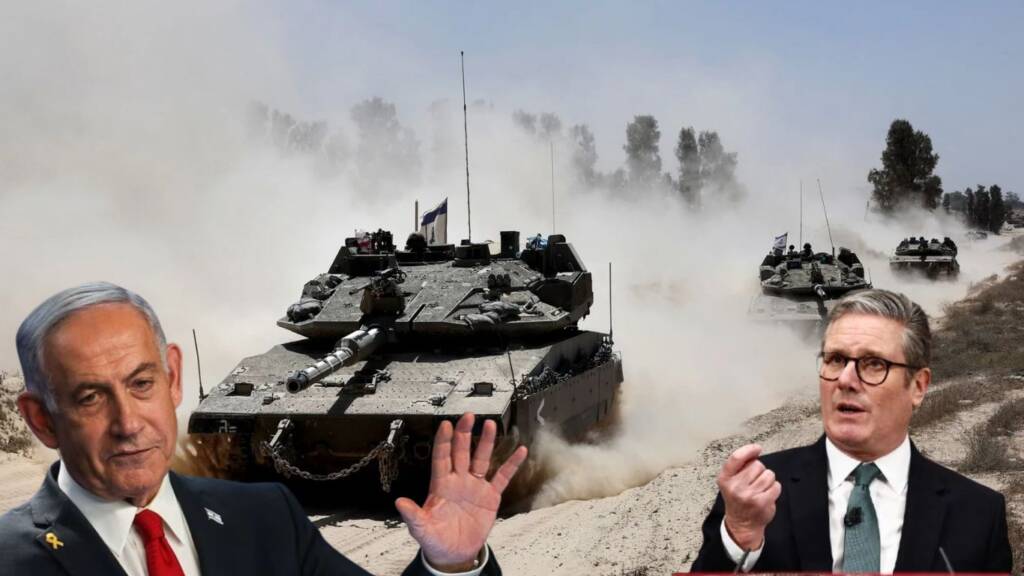In a significant shift in diplomatic posture, the United Kingdom and the European Union have announced measures distancing themselves from Israel over its ongoing military operations in Gaza. The UK has suspended trade talks with Israel, summoned the Israeli ambassador, and imposed fresh sanctions on individuals and groups involved in settler violence in the occupied West Bank. Simultaneously, the EU has confirmed it will review its long-standing association agreement with Israel, citing humanitarian concerns in Gaza.
The UK looks Upset with Netanyahu.
These actions follow a renewed Israeli offensive in the Gaza Strip that began on May 5, with Prime Minister Benjamin Netanyahu stating plans to “take control of the entire Gaza Strip.” International concern has grown rapidly as the offensive continues to exact a heavy toll on civilians, with hundreds reportedly killed and humanitarian aid largely blocked. A limited trickle of aid has entered the enclave recently, but far below the daily requirement of 500 trucks needed to support the population.
British Foreign Secretary David Lammy described Israel’s latest military actions as “morally unjustifiable” and warned that the situation is entering “a dark new phase.” While reaffirming Israel’s right to self-defense after the October 7 Hamas attacks, Lammy criticized the prolonged blockade and disproportionate use of force, highlighting the growing threat of starvation in Gaza. He also condemned the increase in Israeli settler violence in the West Bank, noting an acceleration in land grabs and expansion of settlements.
EU to Review Ties Under Association Pact
In response, the UK has sanctioned three individuals, and four entities associated with the settler movement, marking the second round of such sanctions since last year. The move drew criticism from Israel’s foreign ministry, which labeled the measures “puzzling” and warned that “external pressure will not divert Israel from its path in defending its existence.”
The EU, echoing similar concerns, has taken a more structural step by initiating a review of its association agreement with Israel. EU foreign policy chief Kaja Kallas stated that a “strong majority” of member states supported the review, particularly in light of Article 2 of the agreement, which requires respect for human rights and democratic principles. While the agreement currently governs political, trade, and scientific cooperation, the review could lead to a recalibration of EU-Israel relations.
Israel justified the Military Action
Israel, for its part, has dismissed the international criticism. The government insists that its operations are necessary to pressure Hamas into releasing hostages and eliminating its terrorist’s infrastructure. Officials also claim that aid is now being allowed into Gaza, albeit in controlled quantities, to prevent a humanitarian collapse that could erode international support.
Despite these assertions, aid agencies on the ground paint a grim picture. The United Nations reports that one in five people in Gaza faces starvation, with some 14,000 infants at risk of severe malnutrition. Though 93 aid trucks carrying food, medicine, and baby supplies reportedly entered Gaza on Tuesday, their distribution remains delayed due to Israeli security checks.
Effectiveness of Diplomatic Pressure Unclear
The diplomatic moves by the UK and EU reflect growing frustration among Western governments. British Prime Minister Keir Starmer called the situation in Gaza “intolerable,” while French and Canadian officials have also threatened further sanctions. Australia’s Foreign Minister Penny Wong condemned remarks from Israeli officials and called for an immediate resumption of aid.
Pope Leo XIV, in his first general audience as pontiff, joined the global call for de-escalation and humanitarian access, describing the situation in Gaza as “increasingly worrying and painful.”
Within Israel, dissenting voices are also growing louder. Retired general and opposition figure Yair Golan warned that Israel risks becoming a “pariah state” due to its conduct in Gaza. His remarks drew sharp rebuttals from Netanyahu, who labeled the criticism as “outrageous incitement.”
While international pressure alone may not change Israel’s strategy, the suspension of trade talks and the reassessment of diplomatic agreements signal a turning point. Both the UK and EU appear to be recalibrating their traditionally strong ties with Israel in light of unfolding humanitarian concerns. Whether this will lead to a change on the ground in Gaza remains uncertain, but it undeniably adds to the mounting global scrutiny facing Israel in its military campaign.
